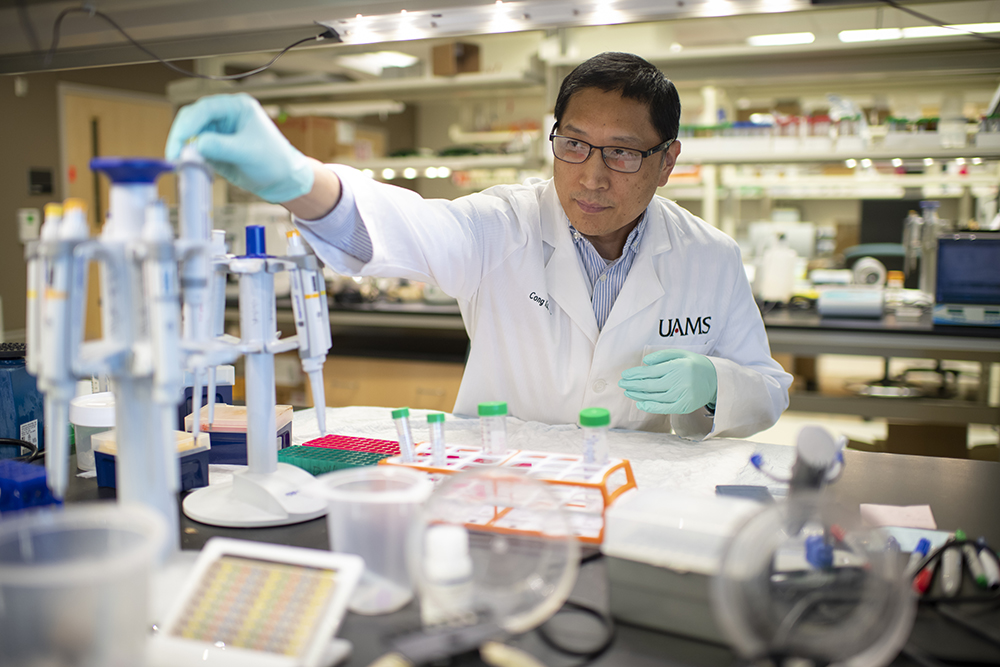Fenghuang “Frank” Zhan, M.D., Ph.D., Awarded Nearly $3.14 Million to Further Myeloma Research
| LITTLE ROCK — Fenghuang “Frank” Zhan, M.D., Ph.D., Myeloma Center research director at the University of Arkansas for Medical Sciences (UAMS), has received two grants totaling almost $3.14 million to study the molecular genetics and drug resistance of multiple myeloma, the second-most common blood-related cancer.
One grant from the U.S. Department of Defense provides $1.4 million, and the other comes from the National Institutes of Health for nearly $1.74 million. Both projects aim to better understand the biological processes behind myeloma in order to search for new treatments and cures.
“Once the biology of myeloma stem cells is better understood, more novel therapeutic targets can be created and tested, with the ultimate goal being to develop a novel therapy and prevent myeloma relapses,” said Zhan, who holds the Morrison Family Endowed Chair in Myeloma Research.
With the DOD grant, Zhan will study the biology of specific myeloma cancer cells that can survive chemotherapy. He hopes to find a potential cure aimed at eradicating these cells. The theoretical treatment has two parts: a stem cell transplant that occurs in two phases coupled with chemotherapy, followed by a particular type of immunotherapy aimed at killing the remaining drug-resistant cells.
Relapses of myeloma and other types of cancers are often caused by these drug-resistant cells.
Specifically, Zhan believes a protein called CD24 may serve as a reliable indicator of the presence of these drug-resistant cells and that a therapeutic antibody called SWA11 could be used to target them.
The DOD grant continues through 2023.
Meanwhile, the NIH-funded study looks in detail at two genes, NEK2 and PD-L1, hoping to uncover how they work and how they possibly drive myeloma.
Patients with these genes are difficult to cure and are at high risk for relapse.
Therapies targeting PD-L1 have been successful in treating many cancers, but attempts to demonstrate their effectiveness for myeloma have been unsuccessful. Zhan believes this is probably because PD-L1 is most common in patients who have a subtype of myeloma known as hyperdiploid, but PD-L1 studies have not targeted this group of patients.
For other subtypes of myeloma where PD-L1 levels are low, such as in high-risk and relapsed myelomas, he theorizes that a combination of a NEK2 treatment and PD-1/PD-L1 treatment could be effective.
Zahn and his team will test these theories at the molecular level using a couple of different methods.
He believes the results could reach far beyond myeloma to assist in treating many other solid tumor and blood-related cancers.
“Dr. Zhan’s research in identifying and targeting myeloma stem cells and the genomic classification of the disease has and will continue to help us to further the innovative treatment we have offered for more than 30 years now,” said Frits van Rhee, clinical director of the Myeloma Center.
The NIH grant runs through 2025.
Zhan received his medical degree and Ph.D. in cancer molecular genetics from Hunan Medical University in Changsha, P.R., China, and his dental degree from West China Medical University in Chengdu, P.R., China. He is a professor of medicine in the UAMS College of Medicine. He previously worked at UAMS from 2002 to 2008 as an assistant professor in the College of Medicine.
Before returning to UAMS in early 2020, Zhan was a professor of medicine at the University of Iowa and an adjunct professor with the University of Iowa’s College of Dentistry and Dental Clinics. He also previously worked at the Utah Blood and Marrow Transplant and Myeloma Program at the University of Utah’s Huntsman Cancer Institute and the Holden Comprehensive Cancer Center at the University of Iowa Health Care in Iowa City, Iowa.
###
UAMS is the state’s only health sciences university, with colleges of Medicine, Nursing, Pharmacy, Health Professions and Public Health; a graduate school; a hospital; a main campus in Little Rock; a Northwest Arkansas regional campus in Fayetteville; a statewide network of regional campuses; and eight institutes: the Winthrop P. Rockefeller Cancer Institute, Jackson T. Stephens Spine & Neurosciences Institute, Harvey & Bernice Jones Eye Institute, Psychiatric Research Institute, Donald W. Reynolds Institute on Aging, Translational Research Institute, Institute for Digital Health & Innovation and the Institute for Community Health Innovation. UAMS includes UAMS Health, a statewide health system that encompasses all of UAMS’ clinical enterprise. UAMS is the only adult Level 1 trauma center in the state. UAMS has 3,275 students, 890 medical residents and fellows, and five dental residents. It is the state’s largest public employer with more than 12,000 employees, including 1,200 physicians who provide care to patients at UAMS, its regional campuses, Arkansas Children’s, the VA Medical Center and Baptist Health. Visit www.uams.edu or uamshealth.com. Find us on Facebook, X (formerly Twitter), YouTube or Instagram.
###
